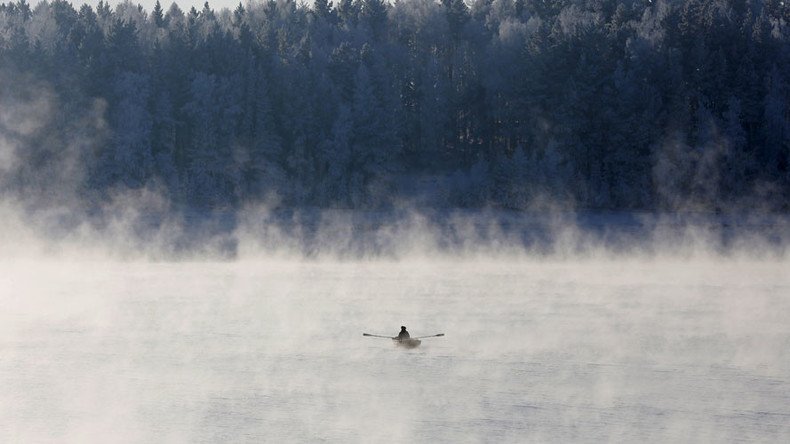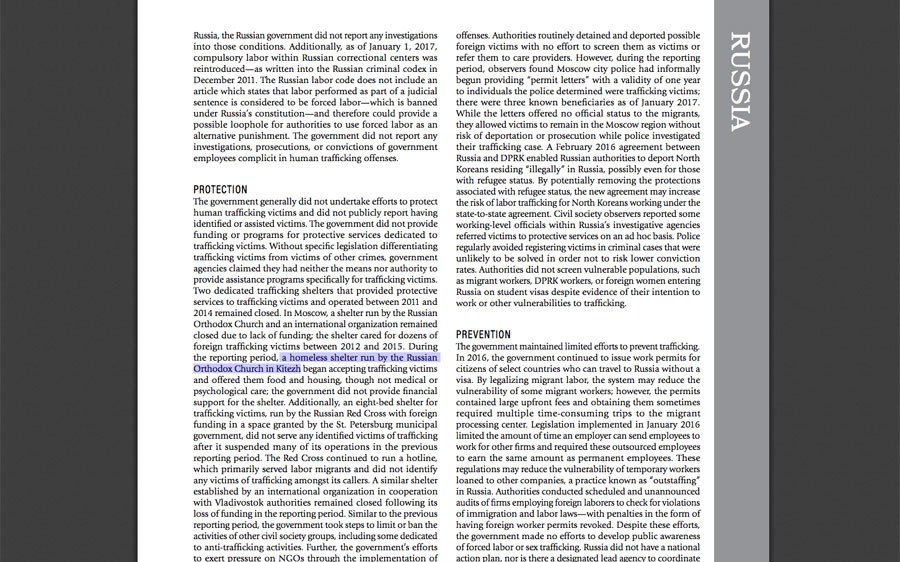US State Dept bashes Moscow for not helping shelter in mythical town known as ‘Russian Atlantis’

A wordy State Department report slammed Moscow for underfunding a church-run shelter offering “food and housing” to the homeless in the Russian town of Kitezh – a mythical place that perished in a lake eight centuries ago, according to ancient legend.
Describing Russia’s poor performance in protecting trafficking victims, a 2017 State Department report entitled ‘Trafficking in Persons’ alleges that Russian authorities “routinely detained and deported potential forced labor victims.”
Some of the victims were “forced into prostitution for prostitution offenses,” the authors stated. They added that the Russian government had even failed to finance rehabilitation for trafficking victims, saying “several privately run shelters remained closed due to lack of funding.”
In one of the more outrageous accusations, the report noted that “a homeless shelter run by the Russian Orthodox Church in Kitezh began accepting trafficking victims and offered them food and housing, though not medical or psychological care,” but “the government did not provide financial support for the shelter.” There’s just one catch – there is no such a city as Kitezh in modern-day Russia; it only existed centuries ago, if it ever existed at all.

Legend has it that a Russian prince founded Kitezh in the early 13th century when he came across a spectacular spot on the shores of Lake Svetloyar. However, the ill-fated town was not to enjoy a long life.
Shortly afterwards, the Mongols invaded ancient Rus and when the Golden Horde reached its walls, the whole city valiantly sank into the lake rather than submit. At least, that’s how the story goes – one it is doubtful that the US State Department is familiar with.
Kitezh has long been the subject of legends and rumors that have survived to this day. Archaeologists have never managed to find the remains of the lost city on the bottom of the lake.
The legendary city has long been a source of inspiration. Kitezh features in famous Russian musical compositions, including The Legend of the Invisible City of Kitezh and the Maiden Fevroniya by Nikolai Rimsky-Korsakov, which premiered in Saint Petersburg in 1907.
The storyline of the 2015 Xbox game Rise of the Tomb Raider follows Lara Croft as she goes to Siberia in search of mythical Kitezh.
There is, however, an existing shelter for “women who are in a difficult situation,” which is indeed run by the Russian Orthodox Church and is called the Kitezh center. It is located in the Milyukovo village located 45km from Moscow.
It appears the US State Department may just have mistaken the shelter’s name for its location, thus placing it in the legendary Russian medieval city.
Gaffes are nothing new for US officials. Jen Psaki, a State Department spokesperson during the Obama administration, famously struggled with the difference between Iraq and Iran during a torrid news conference in June of 2014.
Just last week, the White House found itself in hot water when its press section released a statement that referred to China’s leader, Xi Jinping, as head of the “Republic of China”, which is the official name of Taiwan, which considers itself separate from China, but which the People’s Republic of China still considers its own.
On the same day, the White House incorrectly referred to Japanese leader Shinzo Abe as “President Abe of Japan.” However, Japan is a constitutional monarchy in which the Emperor – whose dynasty is believed to be the longest-ruling in the world – remains the nominal head of state. Abe serves as Japan’s prime minister.













